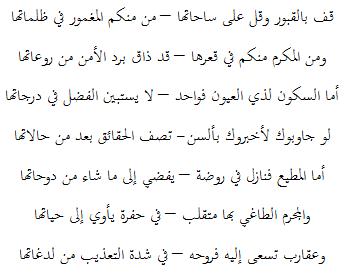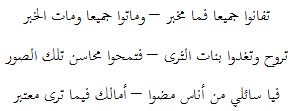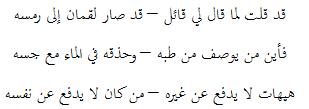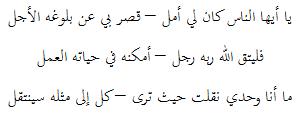ON REMEMBERING DEATH
The Messenger of Allâh  said: “Engage in excessive remembrance of the destroyer of all pleasures.” This means that you should make pleasures feel loathsome by remembering death to such an extent that your inclination towards them is severed and you turn your attention to Allâh
said: “Engage in excessive remembrance of the destroyer of all pleasures.” This means that you should make pleasures feel loathsome by remembering death to such an extent that your inclination towards them is severed and you turn your attention to Allâh  .
.
The Messenger of Allâh  said: “If the animals knew about death what humans know about it, you would not eat any of them that are fat.”
said: “If the animals knew about death what humans know about it, you would not eat any of them that are fat.”
‘Â’ishah radiyallâhu ‘anhâ asked: “O Messenger of Allâh! Will anyone be raised with the martyrs?” He replied: “Yes. The person who remembers death 20 times a day.” The reason behind all these merits is that remembrance of death compels a person to remain aloof from the world of deception and demands that he prepares for the hereafter. Being unmindful of death propels a person to be totally engrossed in the pleasures of this world.
The Messenger of Allâh  said: “Death is the gift of the believer.” The reason why he said this is that the world is a prison of the believer. As long as he is in this world, he is in constant stress in enduring his soul, pacifying his desires and repulsing his Satan. Death thus frees him from this torment. This freedom is therefore a gift in his favour.
said: “Death is the gift of the believer.” The reason why he said this is that the world is a prison of the believer. As long as he is in this world, he is in constant stress in enduring his soul, pacifying his desires and repulsing his Satan. Death thus frees him from this torment. This freedom is therefore a gift in his favour.
The Messenger of Allâh  said: “Death is an atonement for every Muslim.” In saying this, he is referring to a true Muslim and a firm believer from whose verbal and physical harms other Muslims are safe, in whom the true characteristics of a believer are found, who is not tainted by acts of disobedience except minor sins. Death thus purifies him from them [minor sins] and expiates them after he abstains from major sins and fulfils the compulsory duties.
said: “Death is an atonement for every Muslim.” In saying this, he is referring to a true Muslim and a firm believer from whose verbal and physical harms other Muslims are safe, in whom the true characteristics of a believer are found, who is not tainted by acts of disobedience except minor sins. Death thus purifies him from them [minor sins] and expiates them after he abstains from major sins and fulfils the compulsory duties.
‘Atâ’ al-Khurâsânî rahimahullâh said: “The Messenger of Allâh  passed by an assembly in which there was loud laughter. So he said: ‘Mix and blend your assembly with the remembrance of that which contaminates all pleasures.’ They asked: ‘What is it that contaminates all pleasures?’ He replied: ‘Death.’”
passed by an assembly in which there was loud laughter. So he said: ‘Mix and blend your assembly with the remembrance of that which contaminates all pleasures.’ They asked: ‘What is it that contaminates all pleasures?’ He replied: ‘Death.’”
Anas  said: “The Messenger of Allâh
said: “The Messenger of Allâh  said: ‘Remember death excessively for it purifies sins and causes one to abstain from this world.’”
said: ‘Remember death excessively for it purifies sins and causes one to abstain from this world.’”
The Messenger of Allâh  said: “Death is sufficient as a separator.” The Messenger of Allâh
said: “Death is sufficient as a separator.” The Messenger of Allâh  said: “Death is sufficient as an admonisher.”
said: “Death is sufficient as an admonisher.”
The Messenger of Allâh  went out towards the musjid when he saw some people talking and laughing. He said to them: “Remember death. Listen! I take an oath in the name of that Being in whose control is my life, if you only knew what I know, you would laugh little and cry a lot.”
went out towards the musjid when he saw some people talking and laughing. He said to them: “Remember death. Listen! I take an oath in the name of that Being in whose control is my life, if you only knew what I know, you would laugh little and cry a lot.”
Someone mentioned a person in the presence of the Messenger of Allâh  and the people began speaking highly of this person. The Messenger of Allâh
and the people began speaking highly of this person. The Messenger of Allâh  then asked: “What is the extent of your friend’s remembrance of death?” They replied: “We do not hear him talking of death at all.” He said: “Your friend is not what you are saying.” [In other words, he does not deserve the praises you are showering on him.]
then asked: “What is the extent of your friend’s remembrance of death?” They replied: “We do not hear him talking of death at all.” He said: “Your friend is not what you are saying.” [In other words, he does not deserve the praises you are showering on him.]
Ibn ‘Umar  said: “I was one of a group of ten people who went to the Messenger of Allâh
said: “I was one of a group of ten people who went to the Messenger of Allâh  . A person from the Ansâr asked: ‘O Messenger of Allâh! Who is the most intelligent and most honourable of people?’ He replied: ‘The person who remembers death the most and the one who makes the most preparation for it. Such people are the intelligent ones. They have amassed the admiration of this world and the honour of the hereafter.’”
. A person from the Ansâr asked: ‘O Messenger of Allâh! Who is the most intelligent and most honourable of people?’ He replied: ‘The person who remembers death the most and the one who makes the most preparation for it. Such people are the intelligent ones. They have amassed the admiration of this world and the honour of the hereafter.’”
Al-Hasan rahimahullâh said: “Death has disgraced this world and has therefore left no joy for the person of intelligence.” Ar-Rabî‘ ibn Khaytham rahimahullâh said: “There isn’t any unseen thing which a believer waits for that is better for him than death.” He also used to say: “Do not allow anyone to become aware of me, and enable me to slink away to my Sustainer without anyone coming to know of it.”
A wise man wrote to one of his friends: “O my brother! Be cautious of death in this abode before you go to an abode wherein you will desire and hope for death but you will not find it.” When death used to be mentioned before Ibn Sîrîn rahimahullâh, every limb of his body would become dead. It was the habit of ‘Umar ibn ‘Abd al-‘Azîz rahimahullâh to gather all the jurists every night. They would then talk about death, the resurrection and the hereafter. They would then begin crying to such an extent that it was as though there was a corpse before them.
Ibrâhîm at-Taymîy rahimahullâh said: “Two things have cut off the pleasure of this world from me: remembrance of death and standing before Allâh  .”
.”
Ka‘b rahimahullâh said: “When a person recognizes death, the calamities and worries of this world become insignificant to him.”
Mutarrif rahimahullâh said: “I saw in a dream that a person was standing in the centre of the musjid of Basra and saying: ‘The remembrance of death has cut the hearts of the fearful ones. By Allâh, you only see them grief-stricken.’”
Ash‘ath rahimahullâh said: “We used to visit al-Hasan [al-Basrîrahimahullâh]. He only used to talk about the Hell-fire, the affairs of the hereafter and the remembrance of death.”
Safîyyah radiyallâhu ‘anhâ said: “A woman complained to ‘Â’ishahradiyallâhu ‘anhâ about her hard-heartedness. ‘Â’ishah radiyallâhu ‘anhâ said to her: ‘Remember death excessively and your heart will become soft.’ The woman did this and experienced her heart softening. She then came to thank ‘Â’ishah radiyallâhu ‘anhâ.”
When Dâ’ûd  used to remember death and the resurrection, he would cry to such an extent that his limbs would become dislocated. And when he remembered the mercy [of Allâh
used to remember death and the resurrection, he would cry to such an extent that his limbs would become dislocated. And when he remembered the mercy [of Allâh  ], his soul would return to him.
], his soul would return to him.
Al-Hasan rahimahullâh said: “I have not come across an intelligent person who was not cautious of death and not grief-stricken by it.”
‘Umar ibn ‘Abd al-‘Azîz rahimahullâh said to one of the ‘ulamâ’: “Advise me.” He replied: “You are the first caliph to die.” He said to him: “Advise me more.” He said: “There is no one from your forefathers right up to Âdam who has not tasted death. And your turn has now come.” On hearing this, ‘Umar rahimahullâhbegan crying.
Ar-Rabî‘ ibn Khaytham rahimahullâh dug a grave in his house. He would sleep in it several times every day in order to continue remembering death. He used to say: “If the remembrance of death left my heart for a single moment, it will be destroyed.”
Mutarrif ibn ‘Abdillâh ibn ash-Shakhîr rahimahullâh said: “Surely this death has spoilt the pleasures of those who are engrossed in pleasures. You should therefore seek a pleasure in which there is no death.”
‘Umar ibn ‘Abd al-‘Azîz rahimahullâh said to ‘Anbasah: “Remember death excessively. Surely if you are experiencing affluence in life, remembrance of death will constrict it. And if you are experiencing constriction in life, remembrance of death will expand it.”
Abû Sulaymân ad-Dârânî rahimahullâh said to the mother of Hârûn: “Do you love death?” She replied: “No.” He asked her: “Why?” She replied: “If I were to disobey a fellow human, I would not want to meet him. Now how can I want to meet Allâh  when I disobeyed Him?”
when I disobeyed Him?”
Abû Mûsâ at-Tamîmîy rahimahullâh said: “The wife of al-Farazdaq passed away. Many great personalities of Basra attended her funeral. Among them was al-Hasan [al-Basrî rahimahullâh]. Al-Hasan said: ‘O Abû Firâs! What did you prepare for this day?’ He replied: ‘Testimony that there is none worthy of worship except Allâh and that Muhammad is the Messenger of Allâh, for the last 60 years.’ When she was buried, al-Farazdaq stood at her grave and said:

“If You [Allâh] do not pardon me, then I fear something far more blazing and constricting than the grave [i.e. the Hell-fire]. This will happen on the day of resurrection when a stern and strict guard will come to me and herd al-Farazdaq [to the Hell-fire]. The person from the progeny of Âdam who walks towards the Hell-fire fettered in chains and blind has certainly suffered a great loss.”
The following is said with regard to the dwellers of the graves:

“Stand by the graves and proclaim before their open spaces: ‘Who from among you is submerged in its darkness? Who from among you is honoured in its pit, having tasted the coolness of peace from its terrors? As for tranquillity for those who have eyes, this is one. Virtue and merit cannot be distinguished in the stages of the graves. If they [dwellers of the graves] were to answer you, they would have informed you with replies describing the realities of the conditions of the graves. As for the obedient person, he goes down into a garden, reaching any of its tall trees which he likes. As for the transgressing criminal, he twists and turns in a pit seeking refuge by its serpents, and scorpions hasten towards him. His soul thus experiences the severity of punishment from their stings and bites.”
Mâlik ibn Dînâr rahimahullâh says: “I passed by a graveyard, so I began saying:

“I came to the graves and proclaimed to them: ‘Where is that person who considers himself to be very great and the one who looks down on others? Where is that person who is conceited by his authority? Where is that self-righteous person when he vexes in his pride?’”
Mâlid ibn Dînâr rahimahullâh says: “I heard the following reply from the graves. I could hear a voice but could not see anyone. He was saying:

“They have all been destroyed. There is therefore no one to give any reply. They have all died and information about them has also died. The children of the soil come and go in the morning and evening and they obliterate the beauty that is on those faces. So O you who are asking me about people who have passed away! Isn’t there an admonition for you in what you see?”
The following was written on a grave:

“The graves are speaking to you despite being silent. Their inhabitants beneath the ground are quiet and still. O you who are amassing the world for no purpose! For whom are you gathering this world when you are certainly going to die?”
Ibn Simâk rahimahullâh said: “I passed some graves and found the following written on one grave:

“My relatives pass by my grave as though they do not know me. The inheritors are distributing my wealth. They are not even bothered when they refuse to pay my debts. They have taken their shares and are enjoying themselves. By Allâh! How quickly they have forgotten me!?”
The following was written on a grave:

“There are from among one’s beloved ones, he who is an embezzler. Neither a guard nor a sentry can stop death. How, then, can you rejoice with this world and its pleasures?! O he whose every word and every breath is taken to count! You have become neglectful, engrossed in shortcomings. You are engrossed in pleasures your entire life. Death does not show mercy to the ignorant for his heedlessness. Nor does it show mercy to the person from whom knowledge was sought. How many people death reduced to silence at a grave by which you stood! Death silenced the tongue from answering despite it not being dumb. Your palace was fully inhabited and it enjoyed great honour. Today your grave is obliterated among other graves.”
The following was written on a grave:

“I stood by my beloved ones when I visited their graves which were laid out like betted horses. When I cried and my tears flowed, my eyes saw my place [of burial] among them.”
The following was written on the grave of a doctor:

“When someone informed me that Luqmân has reached his grave, I said: ‘Where is that person who was well known for his medical expertise and his mastery in water with his examining [and checking the pulse of patients]!? It is impossible for that person who could not repulse [death] from him self to repulse it from others.”
The following was written on a grave:

“O people! I had a hope. The expiry of my time did not permit me to realize that hope. A person should therefore fear Allâh, his Sustainer, since He has enabled him to do deeds in his life. I am not the only one who has reached this place which you see [i.e. this grave]. Every single person will reach a place similar to this.”
 said: “Engage in excessive remembrance of the destroyer of all pleasures.” This means that you should make pleasures feel loathsome by remembering death to such an extent that your inclination towards them is severed and you turn your attention to Allâh
said: “Engage in excessive remembrance of the destroyer of all pleasures.” This means that you should make pleasures feel loathsome by remembering death to such an extent that your inclination towards them is severed and you turn your attention to Allâh  .
. said: “The Messenger of Allâh
said: “The Messenger of Allâh  used to remember death and the resurrection, he would cry to such an extent that his limbs would become dislocated. And when he remembered the mercy [of Allâh
used to remember death and the resurrection, he would cry to such an extent that his limbs would become dislocated. And when he remembered the mercy [of Allâh 








